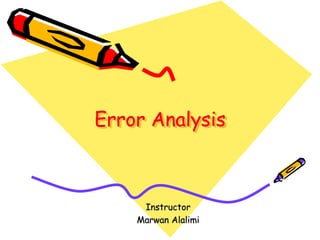Error analysis
•Download as PPTX, PDF•
50 likes•14,881 views
This lecture provides a general feedback to the concept of error analysis and the stages of conducting error analysis, and the sources of errors. ..etc.
Report
Share
Report
Share

Recommended
More Related Content
What's hot
What's hot (20)
Interlanguage and the natural route of development ellis ch. 3

Interlanguage and the natural route of development ellis ch. 3
Similar to Error analysis
Similar to Error analysis (20)
4learnerlanguageinterlanguage 130328142656-phpapp01

4learnerlanguageinterlanguage 130328142656-phpapp01
The Role of Error Analysis in Teaching and Learning of Second and Foreign Lan...

The Role of Error Analysis in Teaching and Learning of Second and Foreign Lan...
Error-Analysis-of-Second-Language-Acquisition.pptx

Error-Analysis-of-Second-Language-Acquisition.pptx
Integrating receptive and productive skills in a reading

Integrating receptive and productive skills in a reading
Recently uploaded
The Author of this document is
Dr. Abdulfatah A. SalemOperations Management - Book1.p - Dr. Abdulfatah A. Salem

Operations Management - Book1.p - Dr. Abdulfatah A. SalemArab Academy for Science, Technology and Maritime Transport
https://app.box.com/s/cbgl8f0rgcll2fzdqp83sjxx8nom8188TỔNG HỢP HƠN 100 ĐỀ THI THỬ TỐT NGHIỆP THPT VẬT LÝ 2024 - TỪ CÁC TRƯỜNG, TRƯ...

TỔNG HỢP HƠN 100 ĐỀ THI THỬ TỐT NGHIỆP THPT VẬT LÝ 2024 - TỪ CÁC TRƯỜNG, TRƯ...Nguyen Thanh Tu Collection
Recently uploaded (20)
Incoming and Outgoing Shipments in 2 STEPS Using Odoo 17

Incoming and Outgoing Shipments in 2 STEPS Using Odoo 17
Operations Management - Book1.p - Dr. Abdulfatah A. Salem

Operations Management - Book1.p - Dr. Abdulfatah A. Salem
slides CapTechTalks Webinar May 2024 Alexander Perry.pptx

slides CapTechTalks Webinar May 2024 Alexander Perry.pptx
The Ultimate Guide to Social Media Marketing in 2024.pdf

The Ultimate Guide to Social Media Marketing in 2024.pdf
Danh sách HSG Bộ môn cấp trường - Cấp THPT.pdf

Danh sách HSG Bộ môn cấp trường - Cấp THPT.pdf
TỔNG HỢP HƠN 100 ĐỀ THI THỬ TỐT NGHIỆP THPT VẬT LÝ 2024 - TỪ CÁC TRƯỜNG, TRƯ...

TỔNG HỢP HƠN 100 ĐỀ THI THỬ TỐT NGHIỆP THPT VẬT LÝ 2024 - TỪ CÁC TRƯỜNG, TRƯ...
Post Exam Fun(da) Intra UEM General Quiz 2024 - Prelims q&a.pdf

Post Exam Fun(da) Intra UEM General Quiz 2024 - Prelims q&a.pdf
Error analysis
- 2. Errors and mistakes • An error : is a faulty utterance produced by language learners as a result of incomplete knowledge. • A mistake : is a faulty utterance produced by language learners caused by lack of attention, fatigue or carelessness.
- 3. Error analysis • The process of studying and analyzing the errors which are made by second language learners. • It studies the types and causes of errors. • It is an alternative to contrastive analysis.
- 4. How errors are seen by behaviorists and cognitivists Behaviorists: Errors are signs of learning failure. Cognitivists: Errors are signs of language development.
- 5. Error analysis is important… why? Errors are helpful for learners to learn. They are useful for teachers to observe the learner’s progress. They are valuable for researchers to find out what strategies learners use and how language is acquired.
- 6. Stages of error analysis Recognition or identification of errors: First step. E.g. 1- George and his child was watching T.V 2- Linda goed to school yesterday. 3- she has taken a translation exam last week. comparison.
- 7. Description: Describing and classifying errors. E.g. 1- George and his child was watching T.V 2- Linda goed to school yesterday. 3- she has taken a translation exam last week. Stages of error analysis
- 8. explanation : Why errors occurred ? 2- Linda goed to school yesterday. 3- The students are clevers. 4- It is car. Stages of error analysis
- 9. Interlingual and intralingual errors Interlingual errors: Errors caused by transferring rules from mother tongue. Intralingual errors: Errors caused by second language processing in its own terms.
- 10. Sources of errors According to Jack Richards, there’re five factors explaining learners' types of errors: 1. Mother tongue interference. 2. Overgeneralization. 3. Ignorance of rule restriction. 4. Incomplete application of rules. 5. False concept hypothesized.
- 11. Mother tongue interference. Differences of languages’ structures. Arabic – English. E.g. They are beautifuls. They students.
- 12. Overgeneralization. Simplification strategy. Learned rule applied to all. E.g. learning to pluralize (-s) Two pens √ Two mouses – Three mans- Two foots.
- 13. Ignorance of rule restriction. The learner lack the knowledge of the rule. E.g. I will let him to drive. I will make her to leave. She can translates very well.
- 14. Incomplete application of rules Learners apply one of the two connected rules. In forming negatives and interrogatives for instance: She speaks English pretty well. (positive) She does not speaks English pretty well.(negative) Do she speak English pretty well? (interrogative)
- 15. False concept hypothesized. Learners wrongly assume something. No rule’s ignored or overgeneralized. E.g. Assuming that Verb be “am – is – are ” , indicate present tense. I am speak French. You are dress elegantly.
- 16. Thank you
